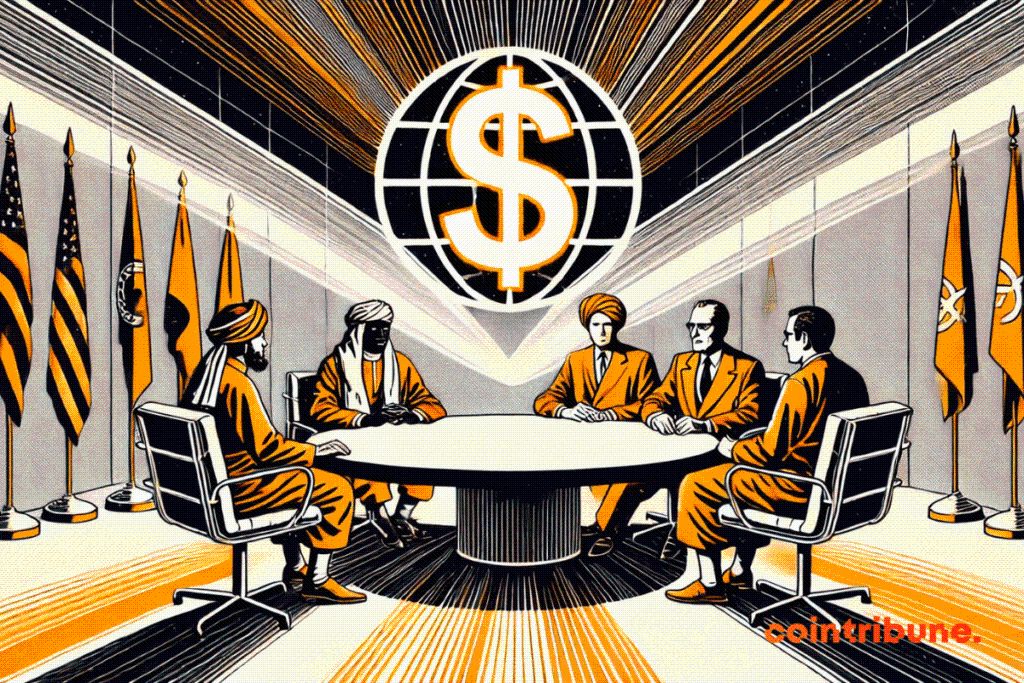Dedollarization in Motion: What BRICS Nations Are Quietly Planning
In a geopolitical context undergoing significant restructuring, two notable initiatives are shaking the hegemony of the dollar. Brazil and China are making a strategic shift by favoring their national currencies for bilateral exchanges. Meanwhile, Russia and Iran announce the launch of a new common currency to circumvent Western sanctions. These distinct but converging movements illustrate a shared desire among influential BRICS members: to build a financial system less dependent on the greenback and assert monetary sovereignty in the face of external pressures.

Brazil – China: an officially established partnership for payments in local currencies
Brazil and China are taking a new step in their common strategy of dedollarization. Thus, their already robust trade relations are now taking a more pronounced monetary turn, with a declared intention to gradually switch to payments in local currencies. This approach has been publicly confirmed by official Brazilian representatives.
Here are the essential facts:
- An official agreement between the two countries for the use of local currencies in bilateral exchanges: this decision aims to reduce dependence on the US dollar in cross-border payments.
- Transactions already in progress in national currencies: Tatiana Rosito, secretary at the Brazilian Ministry of Finance, declares that “trade in local currencies is already underway, for example between Brazil and China”.
- The political support of the Lula government: Brazilian President Luiz Inácio Lula da Silva is actively advocating for a gradual exit from the dollar-dominated system, especially as the next BRICS summit approaches.
- No technical barriers on the Brazilian side: Rosito asserts that “Brazil fully supports the use of local currencies” and “that there are no obstacles to this on the Brazilian side”.
- A clear economic objective: reducing transaction costs for members of the BRICS alliance and strengthening the financial autonomy of the alliance. “The goal is to expand the use of local currencies in every way that will help reduce costs”, specifies Rosito.
- Structural support via the BRICS bank: the New Development Bank allows member countries to avoid resorting to the dollar for financing projects, thus enhancing the effectiveness of this alternative monetary strategy.
This Sino-Brazilian rapprochement is therefore not merely a statement of intent. It signifies a concrete strategic shift towards regionalizing financial flows, driven by institutional means and strong political alignment.
Russia – Iran: a new currency to circumvent the dollar?
In a more speculative but no less symbolic vein, Russia and Iran, two other powers aligned in an increasingly resistant opposition to Western hegemony, claim to be working on the creation of a new common currency within the BRICS bloc.
Kazem Jalali, Iran’s ambassador to Russia, has declared that:
The creation of a new unique currency within the framework of the BRICS association is what Russia and Iran are working on to free themselves from dependence on the dollar.
This announcement comes in the context of increasing economic sanctions against both countries, which are seeking alternatives to maintain the stability of their economies.
However, the details surrounding this project remain very vague. The Iranian ambassador has provided no timeline, precise mechanism, or even concrete elements regarding the progress of this initiative.
Nothing indicates whether this currency is in the active design phase or if it is merely a stated political intention. The lack of transparency fuels skepticism. Some observers do not rule out a communications operation more than a viable project in the short term. Such ambiguity contrasts with the more pragmatic progress of the Sino-Brazilian couple.
Beyond the project itself, this announcement does reflect a desire to rethink the global economic order. If a common currency were to come into existence at the BRICS level, an idea repeatedly mentioned over the years, it could reshuffle the cards of global financial equilibria, provided that the political, technological, and economic obstacles surrounding its creation are overcome. For now, this prospect remains uncertain.
Disclaimer: The content of this article solely reflects the author's opinion and does not represent the platform in any capacity. This article is not intended to serve as a reference for making investment decisions.
You may also like
Elon Musk wants to create a mega API just for IRS data
Share link:In this post: DOGE to create an API or application programming interface that monitors and manipulates IRS data. DOGE’s operatives Sam Corcos and Gavin Kliger will organize a hackathon in Washington, DC next week. Corcos said the IRS’s modernization program is 30 years behind and over budget by $15 billion.

Arthur Hayes foresees a Black Monday stock market crash as Bitcoin falls under $80k
Share link:In this post: Arthur Hayes warned that a Black Monday-style crash may be unfolding as SPX futures opened in Asia. Trump’s new tariffs triggered a massive stock market selloff, with Dow dropping 2,231 points on Friday. Jim Cramer also predicted a Black Monday and said the market’s direction depends entirely on Trump’s next move.

Big Win for Crypto: SEC Says Dollar-Backed Stablecoins Are Not Securities
Can XRP Hit $100 with a 100B Supply? Here’s the Math
